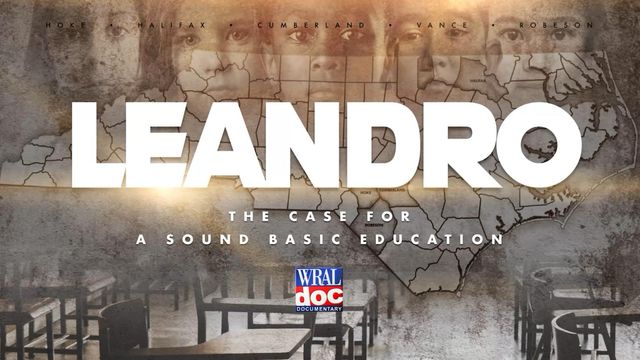NC Supreme Court orders multimillion-dollar fund transfer for Leandro education plan
North Carolina must drastically increase education funding this year, the state Supreme Court ruled Friday, bringing some resolution to a drawn-out legal battle and potentially paving the way for a $5.6 billion increase in annual state education spending.
The North Carolina Supreme Court issued an order Friday upholding a lower-court decision ordering state officials — including the treasurer, controller and the state budget director — to transfer funds for a massive state public education improvement plan.
The order — a major step in the long-running Leandro education funding lawsuit — sends the case back to a trial court, which is expected to recalculate how much money that should be.
Justices voted 4-3 to issue the opinion, two months after hearing oral arguments in the case and four days before two court seats are up for election.
The case’s remedial plan, known as the Leandro Plan is an agreement between school boards and the state intended to fix what the high court said was broken with the state’s education system. It's the result of a years-long legal battle over whether schools were adequately resourced and run.
It calls for at least $5.6 billion in new, annual education spending by 2028 to shore up school resources, as well as numerous policy changes concerning school improvement and accountability.
The remedial plan spawned a political turf battle over who decides how the state’s education system should be run. Payments ordered by the court have been caught in legal limbo as the court has weighed arguments over whether the courts can tell the state how to spend money.
The court’s opinion orders the transfer of funds from state executives to educational entities, without the standard process of lawmakers appropriating funds through a bill. Executives can only access funds through appropriations, but the Court’s opinion upholds an argument that the state’s Constitution — which guarantees adequate education access — suffices as an appropriation of funds in this instance.
“Here, the trial court ignored both the clear language of the appropriations clause and this Court’s binding precedent establishing the General Assembly’s exclusive power to draw funds from the State Treasury,” Berger wrote in his dissenting opinion. “Rather than following our constitution, the trial court invented two novel theories to justify its unconstitutional exercise of legislative power.”
Friday’s opinion states the court has the “inherent power” to order a remedy for constitutional violations.
Friday's order applies to the second and third years of the plan -- last school year and this school year -- which originally called for $1.75 billion, before the most recent state budgets partially funded elements of the plan. Much of that funding was for salary increases, leaving some education programming funding and policy questions unaddressed.
Rough estimates vary, but the remaining funding could total about a half a billion dollars. Funding would go toward increased funding for students with disabilities, schools that serve more lower-income students and early childhood and pre-kindergarten education, and other programs.
“Given these remand instructions, this ruling will not be the final page in the Leandro litigation,” the court’s 137-page majority opinion, written by Associate Justice Robin Hudson, said. “Nevertheless, it is the sincere hope of this Court that it will serve as the start of a new chapter—one in which the parties lay down old divisions and distrust to forge a spirit of collaboration in good faith toward a common goal: constitutional compliance. The same recalcitrant approach would only yield the same inadequate outcomes.”
The Leandro case — so called after one of the original plaintiffs — has vollied about the state court system for almost three decades, a span during which the Supreme Court ruled that the state wasn’t providing an adequate education to public schoolchildren.
Now the remedial plan has spawned a political turf battle over who decides how the state’s education system should be run.
The court’s opinion orders the transfer of funds from state executives to educational entities, without the standard process of lawmakers appropriating funds through a bill. Executives can only access funds through appropriations, but the court’s opinion upholds an argument that the state’s Constitution — which guarantees adequate education access — suffices as an appropriation of funds in this instance.
“Here, the trial court ignored both the clear language of the appropriations clause and this Court’s binding precedent establishing the General Assembly’s exclusive power to draw funds from the State Treasury,” Berger wrote in his dissenting opinion. “Rather than following our constitution, the trial court invented two novel theories to justify its unconstitutional exercise of legislative power.”
Friday’s opinion states the court has the “inherent power” to order a remedy for constitutional violations.
The opinion upholds the November 2021 order by late Judge W. David Lee that called for state executives to transfer the $1.75 billion to state education authorities to implement the remedial plan’s second and third years.
The opinion does not explicitly state the remainder of the eight-year plan must be funded.
Rather, opinion says the court is upholding “our own obligation to safeguard the constitutional rights of North Carolina’s schoolchildren while still allowing for our coequal branches to correct course in the years to come.”
In his dissenting opinion, Justice Phil Berger Jr. – son of Senate President Pro Tempore Phil Berger Sr., R-Rockingham, a defendant-intervenor in the case – said the court had skipped required hearings and expanded the scope of the 2004 Supreme Court ruling that last ordered a remedy in the case.
Spokespeople for Sen. Berger and North Carolina House Speaker Tim Moore, R-Cleveland, told WRAL News the lawmakers were still reviewing the opinion and declined to comment.
“Under no circumstance, however, should this Court take the astonishing step of proclaiming that ‘inherent authority’ permits the judiciary to ordain itself as super-legislators,” Justice Berger wrote. “This action is contrary to our system of government, destructive of separation of powers, and the very definition of tyranny as understood by our Founding Fathers.”
Berger’s opinion was joined by Chief Justice Paul Newby and Associate Justice Tamara Barringer.
Hudson’s majority opinion was joined by Associate Justices Samuel Ervin IV, Michael Morgan and Anita Earls.
Elections on Tuesday could result in the replacement of two of the justices who voted in the majority. Hudson has chosen not to run again. If Ervin is not reelected, his term will expire Dec. 31, alongside Hudson’s.
‘A huge leap forward’
Lawmakers, who argued against the remedial plan being ordered by a court, had argued the scope of previous court findings in the Leandro case was limited to only at-risk students in Hoke County. That’s where the 15-month trial took place in the early 2000s.
While evidence submitted in that case went beyond Hoke County, which had been determined to be a representative low-wealth county, lawmakers argued court orders hadn’t explicitly stated a finding that the state was failing to provide a sound basic education to all North Carolina students.
The majority of justices disagreed. Justices argued the court doesn't consider only formal orders and findings of fact. It can also consider evidence submitted in years of court proceedings and memos and other documents issued by lower court judges. That evidence and documents showed the state has failed to provide children with access to a sound basic education, the opinion states.
“To cover our eyes and plug our ears to the trial court’s express and repeated findings and conclusions of a statewide Leandro violation because of procedural imperfections would squarely violate” court precedent that prohibits favoring form over substance, Hudson wrote.
“It’s a huge victory in that you have a definitive ruling that there is a statewide violation and that statewide violation results in a statewide remedy,” said former Justice Bob Orr, who wrote the 2004 state Supreme Court ruling in Leandro that led to the remedial plan. “That’s a huge leap forward from Leandro II.”
Leandro II refers to the 2004 ruling, which Orr had said was not written based on broad, statewide litigation.
Advocates declare victory
For some, the ruling comes at a critical time.
Elaine Zukerman, advocacy and communications director at the NC Early Education Coalition, said early childhood education and childcare slots are in short supply and federal funding that’s been helping to retain teachers will expire in a year.
The Leandro Plan would expand the money available for Smart Start and the funding for the WAGE$ program, which pays early childhood teachers more money for their education and continued employment. That program isn’t in dozens of counties, such as Wake county, because there’s not enough money to provide the funding for everyone who qualifies, Zukerman said.
“The biggest issue we’re facing right now is really the workforce crisis,” she said.
Average wages for early childhood teachers was $12 per hour across the state before the temporary funding provided them with a pay boost. That was in part because the cost of providing childcare is so high and because state subsidies and reimbursements for NC Pre-K or Smart Start seats are lower than the actual cost of those seats, Zukerman said. So more funding for more students hasn’t yielded more students, because schools can’t afford to enroll more students or can’t find a teacher. Some have empty classrooms, Zukerman said.
“You can’t increase the number of children served unless you’re also making sure the reimbursement rates are adequate enough providers can afford fo provide the service,” Zukerman said. So some providers keep teacher pay low to make ends meet, she said.
Retention is so bad in childcare, Zukerman said, that her own son had six different teachers last year.
“It’s our constitutional duty to ensure every child has access to a sound basic education,” Democratic Gov. Roy Cooper, who has proposed full funding of the Leandro Plan in budget requests to lawmakers, said in a statement on Friday, “. As the NC Supreme Court has affirmed today, we must do more for our students all across North Carolina.”
Every Child NC, a coalition of dozens of nonprofits formed to advocate for the plan celebrated “the North Carolina Supreme Court’s decision to, at long last, uphold our children’s rights as enshrined in the North Carolina Constitution.”
What happens next
With five years left of the plan and negotiations of the state’s budget next year about to start, a legal dispute over whether lawmakers are complying with the plan could come up again, soon.
It could end up before judges who decide to follow the precedent established in Friday’s state Supreme Court ruling. It could end up before the state Supreme Court again, which could flip to favor Republicans in Tuesday’s election.
What happens next may not be automatic, Orr said.
The trial court Judge Michael Robinson would likely schedule briefs and a hearing to determine the remaining funds through this year, Orr said.
“Then (the controller) is back in between a rock and a hard place,” Orr said. Lawmakers could contemplate a workaround, he said.
“That’s the real problem with this real nobody talking to each other in the sense of ‘How do we resolve this?’" he said.
Orr notes school systems largely still haven’t been paid the more than $700 million in fines and forfeitures revenues a superior court said they were owed back in 2008.
CORRECTION: A previous version of this article and article's headline misstated whom the court ordered to transfer the funds. It's the state budget director, the treasurer and the controller.











